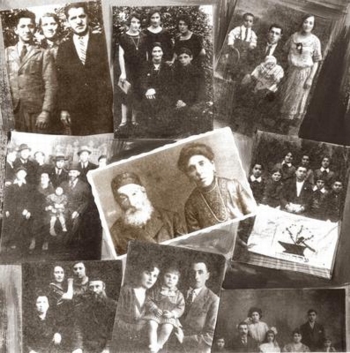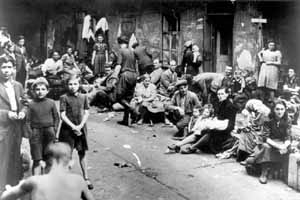 January 07
January 07
Start Making Sense: The "Elaborate Nonsense" of Poles, Jews, and the Holocaust
by Mordecai Drache
p. 2 of 3
 The term Zydokomuna was originally introduced in 1817 by Ursyn Niemcewicz in a work entitled The Year 3333. The work posited a future in which a Communist Poland would be run by assimilated Jews. It is not a coincidence that the period when this work was published in the 19th century marked a period in European Jewish history known as the Haskalah, or the Jewish Enlightenment. The Haskalah opened Jews to new areas of knowledge, often freeing them from the traditional constraints of their religious communities. A greater emphasis on literacy amongst Jews relative to their Christian neighbors served as a significant advantage in opening Jews to new professional opportunities. However, old prejudices die hard. Well into the 20th century, Polish political parties, including the ruling Endecja – the National Democratic Party – were fiercely anti Semitic. According to Jedlicki, the more Polish Jews attempted to claim an equal place in society, the more barriers were put in their paths. Anti-Jewish violence actually increased during the interwar period, and campaigns to exclude Jews from universities and certain professions, though not always successful, were a popular example of this trend.
The term Zydokomuna was originally introduced in 1817 by Ursyn Niemcewicz in a work entitled The Year 3333. The work posited a future in which a Communist Poland would be run by assimilated Jews. It is not a coincidence that the period when this work was published in the 19th century marked a period in European Jewish history known as the Haskalah, or the Jewish Enlightenment. The Haskalah opened Jews to new areas of knowledge, often freeing them from the traditional constraints of their religious communities. A greater emphasis on literacy amongst Jews relative to their Christian neighbors served as a significant advantage in opening Jews to new professional opportunities. However, old prejudices die hard. Well into the 20th century, Polish political parties, including the ruling Endecja – the National Democratic Party – were fiercely anti Semitic. According to Jedlicki, the more Polish Jews attempted to claim an equal place in society, the more barriers were put in their paths. Anti-Jewish violence actually increased during the interwar period, and campaigns to exclude Jews from universities and certain professions, though not always successful, were a popular example of this trend.
As mentioned earlier, the communists were the only political party that accepted Jewish members – so long as they gave up their religious views, limiting themselves to a cultural Jewish identity that separated them not only from their religious roots, but often from their families as well. Given how proscribed, constraining, and claustrophobic Jewish life could be, particularly for women, divorce from Jewish roots was a welcome opportunity in many cases. In theory, communism pledged to unite people across ethnic lines through class struggle. Given that the Endecja refused to provide outlets for political activism to Jews, it is easy to see why communism would become compelling for some.
Elaborate Nonsense
While there were indeed thousands of sympathetic Poles who risked their lives to save Jews, those “thousands” were a significant minority. With a population of 3.3 million, Poland had by far the biggest Jewish population in all of Europe – and in fact in any nation in the entire world – prior to the Holocaust. According to Gross, the economic status of most Jews was “lower middle class.” Though hardly reaching a level resembling the worst anti Semitic stereotypes, the class status that Jews actually occupied ultimately translated to very real material benefits for Polish Christians. Once their neighbors’ houses were left vacant with all of their contents still inside, their Jews former occupants either banished or dead, large numbers of impoverished Poles living under occupation availed themselves to formerly Jewish property quickly and completely.
That the vast majority of Jedwabne’s Jews were killed is not disputed by most Polish historians, nor is the fact that some Poles who had friendly relationships with their Jewish neighbors were involved in the carnage. They accept the repugnance of the slaughter as well. According to Polish historians who dispute Gross’ findings, points of ambiguity include whether or not the majority of Jedwabne’s Jews were killed on that day in July 1941 or during other periods of Nazi occupation, the number of Germans in the city, and the precise role of resident Germans in the slaughter. The results of the partial exhumation suggest another reason for their questioning Gross, as does disagreement about the degree of force Nazis may have used (or not, as Gross insists) in compelling the Christians of Jedwabne to kill Jews
But the issues most worthy of debate, I think, center around methodology – namely the reliability of sources collected fifty years after the fact, an element that Gross ignores but with which other historians agree. These include inconsistencies in the testimonies of the few Jewish survivors after the war ended and Gross’ use of trial transcripts in which the evidence collected from the “alleged” murderers came through beating. Confessions obtained through any use of physical interrogation should rightly be treated with skepticism.
To put it succinctly, there are probably well-grounded reasons for critiquing Gross. Questioning Gross’s historical methodology is not anti Semitic, and Gross himself does not claim it to be. The anti Semitism that creeps into the debate does so as part of the charge of Jewish/Soviet “collaboration,” a defensive charge that is bound to affirm stereotypes of Poles as hateful anti-Semites for Jews and non-Jews alike.
One of the most prominent culprits in this mode of thought is Tomasz Strzembosz, a prominent and respected historian specializing in study of Polish resistance against the Soviets at the Catholic University of Lublin. Strzembosz, whose scholarly focus is the region in which Neighbors takes place, has been criticized for never writing about the murder of Jedwabne Jews or other local towns, even though it is impossible for him not to have known about them. His responses to these critiques have been chillingly hateful diatribes that paint pre-Holocaust Jews as a homogenous population of traitorous, murderous, anti-Polish communists. In his essay "Collaboration Passed over in Silence" from The Neighbors Respond, he writes:
The 'militias,' 'red guards,' and revolutionary committees’
were the first to cooperate [with the Soviets], and the
workers’ guards and citizens’ militias…consisted mainly
of Polish Jews. Subsequently, when the Worker-Peasant
Militias took control of the situation, Jews were
considerably overrepresented in them. Polish Jews…
participated in arrests and deportation in large numbers.
This was the most extreme example but for Polish Society,
the most glaring fact was the large number of Jews
in Soviet public offices and institutions – the more so
since Poles had been the dominant group before the war.
The essay goes to quote several sources ranging from diaries to articles written by a wide range of people – including journalists, a nun, and others highlighting the take-over of public institutions by Jews. He also describes Jewish participation in ugly events, including killings and deportations. Seizing upon a source used by Gross in one of his Polish-language essays, he quotes remarks made by Jews to Poles: “You wanted a Poland without Jews, now you have Jews without Poland.” The essay crosses into the realm of the disturbing and the bizarre with the following passage:
Indeed, Jews may have not had things too good in pre-war
Poland…However they were not deported to Siberia; they
were not shot or sent to concentration camps; they were
not deported to Siberia, they were not killed through
starvation and hard labor. If they did not regard Poland as
their homeland, they did not have to join its mortal enemy
in killing Polish soldiers and murdering Polish civilians.
But the truly revolting statement comes with the following:
Did the Polish inhabitants of Jedwabne and the surrounding
villages enthusiastically welcome the German as saviors?
Yes, they did! If someone pulls me out a of a blazing house,
I will embrace and thank that person. Even if the next day,
I regard him as yet another mortal enemy
Tellingly, throughout his polemic there is no examination of statistics regarding Jewish involvement in communism, or communism in Polish society as a whole. There is no discussion of demographics in terms of religious practice among Jews, including Hasidim, whose religiosity would have placed them in opposition to the communists. Nor is there any speculation about how the Polish view of Germans as “saviors” – to use his term – would have driven wedges between Christians and Jews in regions that the Soviets were dominating, including Jedwabne.

Jedwabne’s inhabitants were trapped under Soviet occupation in 1939, then German occupation in 1941. The murders that took place were clearly ones in which Jews were marked as supporters of the Soviets. The question of whether or not Jews were communists per se or simply unsupportive of the Germans remains unanswerable, as well as an open debate. The murders in Jedwabne included several devout Jews, including the cheder instructors and the kosher butcher, whose religious beliefs could not have corresponded with communism, a subtlety that escapes Strzembosz. In a time of extreme insecurity, the latter could likely be mistaken for the former. However, as Gross shows, Zydokomuna was certainly an element of the hatred. In Neighbors, an elderly woman testifies:
I saw how they ordered young Jewish boys to take off
Lenin’s monument, how they were told to carry it around
and shout, 'War is because of us.' I saw how they were
beaten at the time with rubber truncheons, how Jews
were massacred in the synagogue, and how the massacred
Lewiniuk, who was still breathing, was buried alive by
our people.
Gross describes how Jews were knifed, drowned, dismembered, and buried alive in ruthless, unsparing detail. A pregnant Jewish woman had her abdomen ripped open by the Gentile farm-hand of her father. A little girl’s head was sawed off and kicked like a soccer ball. Jewish women were raped. Tellingly, one of the Jewabne Jews who was offered amnesty for hiding a Polish army officer from being kidnapped by the Soviets refusing it, choosing instead to die with the rest of the Jewish community. Of course, Jews were killed in these very same ways by Germans and Soviets alike.
In a roundtable discussion in which Strzembosz and Gross took part, Gross stated:
Between one fourth and one third of the deported civilians
[under the Soviets] were Jews. Your article says, 'The Poles
are persecuted by the Jews; the Jews sent them to God knows
where.' Well, it was not like that. The Jews suffered just as
much as everyone else under the Soviet occupation, if not
more. The whole stereotype of Jews supporting the
Bolsheviks and Communists is nonsense.
Strzembosz’s response:
The problem arises when the Jews flee from the Lublin
region across the San River but are greeted with machine
gun fire. They choose the Soviet Union but the Soviet
Union does not want them…If the Jews collaborate with
the Soviets, and I know of several such cases, and are
subsequently sent into the depths of the USSR, it does not
mean that they are merely victims and never executioners…But what troubles is not the triumphal arches but
the fact that in sixteen in places in so-called Western
Belarus, Jews open-fired on Poles.
That is why information about 30, 40, or 5 percent of
the Jews being deported is no answer to the question about
the extent of their collaborations with the occupation regime.
(emphasis added)








